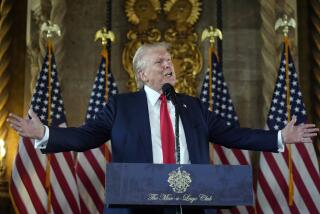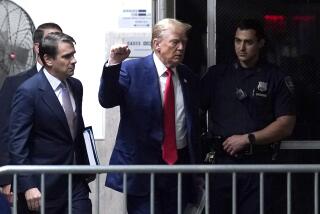Playing Politics With Grand Jury Testimony
- Share via
For more than six months, the public has been content for President Clinton to say very little on the subject of his alleged sexual relationship with Monica Lewinsky. Now the media are awash in advice to the president that he admit to a sexual relationship with the former intern. What precipitated this change is the subpoena served by Kenneth Starr calling for Clinton to testify under oath before the grand jury, which the president has agreed to do on Monday.
The advice that the president adopt what is referred to as the mea culpa scenario is based on two assumptions: first, that the president did have a provable sexual relationship with Lewinsky and, second, that to lie to a grand jury may be indefensible in an impeachment inquiry, whereas the president would be excused if he admits that he gave false deposition testimony about a matter of doubtful relevance in a civil suit that has now been dismissed as groundless.
What everyone seems to take for granted is that compelling the testimony of the target of a grand jury investigation is standard operating procedure for prosecutors trying to get to the truth. Not so. Starr’s decision to compel the president to testify is a political choice masquerading as legal routine.
Hundreds if not thousands of times a day in this country, prosecutors conclude investigations (often with indictments) without benefit of sworn testimony of the target of the investigation. In fact, long-standing Department of Justice policy strongly discourages prosecutors from subpoenaing targets before the grand jury. The thinking is that it is fundamentally unfair to require a target to make the Hobson’s choice either to answer questions under oath or assert a 5th Amendment privilege, thereby declaring to the very people who are sitting in judgment that the truthful answer would be incriminating. No good and fair prosecutor views the failure to obtain the target’s sworn version of events as compromising the thoroughness of an investigation. And hundreds if not thousands of times a day in this country, judges and juries in federal and state criminal cases determine the “truth” based on the evidence before them, even when it does not include the sworn testimony of the accused.
Starr’s investigation of the Lewinsky matter has been breathtaking in its scope and its attention to details that most people--prosecutors included--wince at examining. Does anyone believe that if Clinton were to deny the sexual relationship under oath, Starr would thank the president for clearing up the matter and write a report exonerating Clinton of any wrongdoing? Of course not. Most people made up their minds about the truthfulness of Clinton’s testimony long ago, and nothing he says Monday is likely to change that.
The question of whether the president should address comprehensively the allegations against him is purely political. The president has not answered questions to date because the public, in the way that it has reacted to the scandal, has not insisted upon it.
Monday’s showdown, then, is not a prerequisite to a proper conclusion of the grand jury’s investigation. It is simply the climactic event in a high stakes game of “gotcha,” in which the president’s responses to questions--sure to become public--may destabilize his political standing, one that so far has insulated him from a serious risk of impeachment. Compelling the testimony of the president is not an attempt to discover the facts. Starr is forcing the president to sit for a test--a character test, which the prosecutor believes the president will fail, whatever answers he gives.
The question is: Does Starr have any business playing that game? Starr’s mandate was to investigate an offense that is alleged to have occurred more than six months ago. That alleged offense may or may not be grounds for impeachment. After Monday, there will be new sworn testimony by the president, this time before the grand jury. If Clinton denies a sexual relationship with Lewinsky, that will likely be the major offense reported by Starr to Congress as grounds for impeachment. Thus, contrary to normal prosecutorial practice, Starr is creating the opportunity for the commission of an offense, not investigating one that has already occurred.
While the president will be responsible for what he says on Monday, any impeachment proceedings based on his grand jury testimony will be the result of Starr’s decision to abandon the normal practice of prosecutors not to acquire targets of their investigation to testify. Starr’s decision was a political choice, not a legal one, and it should have been left to the politicians.
More to Read
Get the L.A. Times Politics newsletter
Deeply reported insights into legislation, politics and policy from Sacramento, Washington and beyond. In your inbox twice per week.
You may occasionally receive promotional content from the Los Angeles Times.










